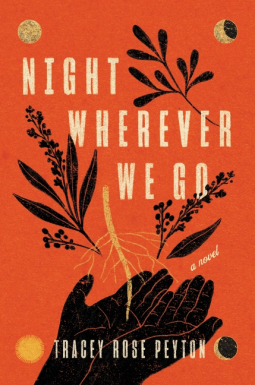Summary: On a struggling Texas plantation, six enslaved women slip from their sleeping quarters and gather in the woods under the cover of night. The Lucys—as they call the plantation owners, after Lucifer himself—have decided to turn around the farm’s bleak financial prospects by making the women bear children. They have hired a “stockman” to impregnate them. But the women are determined to protect themselves.
Now each of the six faces a choice. Nan, the doctoring woman, has brought a sack of cotton root clippings that can stave off children when chewed daily. If they all take part, the Lucys may give up and send the stockman away. But a pregnancy for any of them will only encourage the Lucys further. And should their plan be discovered, the consequences will be severe.
Visceral and arresting, Night Wherever We Go illuminates each woman’s individual trials and desires while painting a subversive portrait of collective defiance. Unflinching in her portrayal of America’s gravest injustices, while also deeply attentive to the transcendence, love, and solidarity of women whose interior lives have been underexplored, Tracey Rose Peyton creates a story of unforgettable power. (Summary and pic from goodreads.com)
My Review: In honor of Black History Month in February, I have been trying to read books written by Black authors, and have done this learn more about Black history and Black stories.
This story was gut-wrenching. I have read many stories of enslaved people over the years, and I think that two things are happening 1) I’m becoming more sensitive to the issues that these people faced. It’s terrible, it’s unforgivable, it’s extremely difficult to even imagine. 2) The literature surrounding the topic of enslaved people has become more pervasive, accessible, and honest. Yes, there have always been people telling the truth and educating us, but now that the conversation has been expanded and progressed, it has also allowed the literature to expand and explore other stories that may not have surfaced before.
There were things I really appreciated about this book. It definitely had an atmosphere–the desperation of the Lucys was palpable, and that made the enslaved women’s situation feel more precarious. In addition, I appreciated the use of “we” when the women were discussed together. I thought that was really interesting, and created a sense of community not only among the women who were enslaved, but the people in their orbits as well. It created a strong sense of community between the enslaved people from different plantations, but also created a clearer delineation between the owners and the people who were enslaved. It was an interesting dichotomy and further highlighted the tragedy and complications of it all.
There are a few things I wanted from this book that I didn’t get. First of all, I would have liked to have the women more fleshed out. Some of them I barely even knew their names, and I would have been interested in their stories. I think there was a missed opportunity there. Also, the story was interesting overall but I wanted more from it. I wanted more to happen so that I knew why the story went where it did. Also, I think there was just more story to tell. The book wasn’t very long so I think that it could have had more information overall in it.
If you are wanting to read more stories of Black History from Black voices, or just want to learn more, this is a great book. It is well-written and beautiful.
My Rating: 3 Stars
For the sensitive reader: This book is difficult in that there is rape, violence, and enslaved people.
Source link



